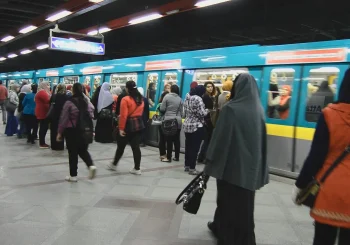The bustling streets of Cairo have seen a remarkable rise in the use of ride-sharing services, offering a convenient solution for navigating the city’s traffic.
However, this booming industry has also exposed a troubling undercurrent of safety concerns for women, who face a range of harrowing experiences that threaten their safety.
The tragic story of Habiba Al-Shamaa, known as the “Al Shorouk Girl,” is a reminder of the dangers women can face while using these services.
Al-Shamaa died on 14 March 2024, after jumping out of a car last February, fearing a kidnapping attempt by an Uber driver who allegedly sprayed perfume inside the vehicle, making her feel threatened.

An eyewitness reported that Al-Shamaa opened the backdoor and jumped out, informing the bystander that the driver had attempted to abduct and assault her before passing out. The driver was then sentenced to 15 Years and fined EGP 50,000 (USD 1,036) on Monday, 15 April.
Beyond the tragic story of Al-Shamaa, numerous other accounts illustrate the pervasive violence, disrespect, and abuse that women face daily when using ride-share services in Egypt. To further explore this issue, Egyptian Streets interviewed four women about their experiences with these apps.
Nadine Sami, a 24-year-old graphic designer, experienced a similarly horrific encounter. While on her way home from the Cairo Opera House to Maadi, the driver decided to take a detour into the cemeteries on Autostrad Road.
Terrified, Sami panicked and started screaming for help, eventually jumping out of the car as the driver seemingly panicked and stopped the car mid route. In the aftermath, Sami sustained minor injuries, but was left deeply traumatized by the experience.
For 25-year-old analyst Zeina Ragab, the problem lies not only in physical safety, but also in the deeply ingrained cultural biases and misogyny that some drivers exhibit. Ragab was once denied a ride by a driver who refused to take her, saying, “I do not take unveiled girls by themselves in my car.”
Noha Samir, a 45-year-old admissions manager at Eslsca University, faced a different kind of ordeal.
Her driver, despite being lost and clearly struggling to navigate using Google Maps to reach her destination, refused to heed Ragab’s directions. Ignoring her guidance, he became increasingly aggressive, going so far as to lower his window and shout the loudest and most disrespectful curse words as soon as she left the car and reached her destination.
The outburst was intended as the diver was trying to prove that no woman should be telling him how to get there.
The incident left Noha feeling violated and powerless in the face of blatant disrespect.
Finally, Omayma Ahmed, a 55-year-old accountant, was threatened by a driver who demanded she cancel her trip because she wanted to pay using her credit card instead of cash. He warned that he knew where she lived and would come to her house to confront her. This encounter left Omayma feeling anxious and concerned for her safety, even long after the trip had ended.
These incidents, while deeply disturbing, are not isolated occurrences. They reflect a systemic failure to address the safety concerns of women in the rapidly expanding ride-share industry.
The convenience and accessibility of these services have become double-edged swords, as women are increasingly forced to navigate a landscape fraught with the potential for harassment, assault, and even life-threatening situations.
As the ride-share industry continues to reshape transportation in Egypt, service providers will need to implement more robust safety measures. Comprehensive safety protocols, enhanced driver screening processes, and better mechanisms for reporting and addressing incidents of misconduct could help ensure that women can access these services without fear for their wellbeing.
Additionally, cultural education and awareness campaigns targeting both drivers and passengers could help address the deeply rooted misogynistic attitudes that enable such incidents to occur in the first place.
The stories shared by Habiba, Nadine, Zeina, Noha, and Omayma underscore the need for the safety and dignity of women to be prioritized in Egypt’s evolving mobility landscape.
Only then can the convenience of ride-sharing truly become a liberating force, rather than a source of vulnerability for those who rely on it.
Striking the right balance between innovation and safeguards will be crucial as this industry continues to grow and evolve in the years ahead.
The opinions and ideas expressed in this article are the author’s and do not necessarily reflect the views of Egyptian Streets’ editorial team.
To submit an opinion article, please email [email protected].







Comments (0)